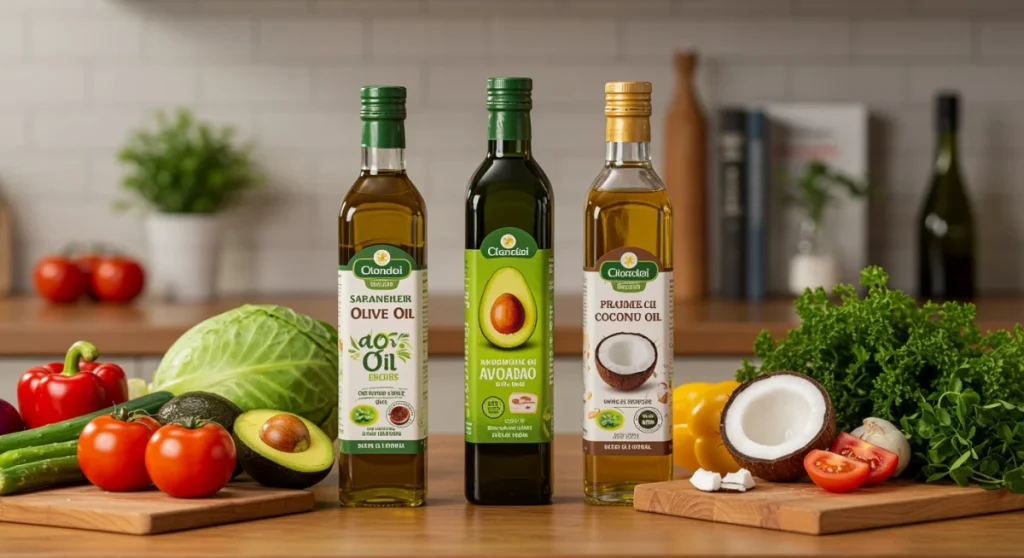Healthy Cooking Oils 2025: Benefits & Best Uses

Comparing three popular healthy cooking oils for 2025 reveals distinct health benefits and ideal culinary applications, guiding consumers toward optimal choices for various healthy recipes.
Choosing the right cooking oil can significantly impact the nutritional value and flavor profile of your meals. This comprehensive guide delves into comparing 3 popular healthy cooking oils for 2025: a recipe-based analysis of their health benefits and best uses, providing insights to empower your culinary decisions for a healthier lifestyle.
Understanding Healthy Fats: The Foundation of Smart Oil Choices
Before diving into specific oils, it’s crucial to understand the role of healthy fats in our diet. Fats are essential macronutrients, vital for energy production, nutrient absorption, and hormone regulation. Not all fats are created equal, however, and distinguishing between beneficial and detrimental types is key to making informed choices.
Monounsaturated and polyunsaturated fats are generally considered ‘healthy fats.’ They can help lower bad cholesterol levels, reduce inflammation, and provide essential fatty acids that the body cannot produce on its own. Saturated fats, while necessary in moderation, should be consumed judiciously, and trans fats are best avoided entirely due to their adverse health effects.
The Science Behind Healthy Fats
Recent research continually underscores the importance of incorporating healthy fats into our daily diets. These fats contribute to cardiovascular health by improving lipid profiles and can play a role in managing blood sugar levels. They also enhance the absorption of fat-soluble vitamins like A, D, E, and K, which are crucial for various bodily functions.
- Monounsaturated Fats (MUFAs): Found in olive oil, avocado oil, and nuts, MUFAs are known for their heart-healthy properties.
- Polyunsaturated Fats (PUFAs): Abundant in certain vegetable oils, fish, and seeds, PUFAs include omega-3 and omega-6 fatty acids, essential for brain function and cell growth.
- Saturated Fats: Present in coconut oil, butter, and red meat, these should be consumed in moderation as excessive intake can raise LDL cholesterol.
Making informed choices about cooking oils begins with recognizing their fatty acid composition and understanding how each type interacts with our bodies. This foundational knowledge empowers consumers to select oils that not only taste good but also contribute positively to their overall well-being, aligning with health goals for 2025 and beyond.
Extra Virgin Olive Oil: The Mediterranean Staple
Extra virgin olive oil (EVOO) has long been celebrated as a cornerstone of the Mediterranean diet, renowned for its distinctive flavor and impressive health benefits. Produced by simply pressing olives, it retains its natural antioxidants and beneficial compounds, making it a premium choice among healthy cooking oils.
Its rich, fruity, and sometimes peppery notes make it versatile for various culinary applications, particularly those that don’t involve high heat. The health advantages of EVOO are well-documented, primarily attributed to its high content of monounsaturated fatty acids (MUFAs), specifically oleic acid, and powerful antioxidants like polyphenols.
Health Benefits and Culinary Applications
The antioxidant content in EVOO helps combat oxidative stress and inflammation, contributing to a reduced risk of chronic diseases. Studies have linked regular consumption of EVOO to improved cardiovascular health, better blood sugar control, and even potential anti-cancer properties. Its anti-inflammatory effects are particularly noteworthy, offering systemic benefits.
- Heart Health: High in MUFAs, EVOO helps lower LDL (bad) cholesterol and raise HDL (good) cholesterol.
- Antioxidant Power: Rich in polyphenols, it protects cells from damage by free radicals.
- Anti-inflammatory Properties: Compounds like oleocanthal act similarly to ibuprofen, reducing inflammation.
When it comes to cooking, EVOO shines in low to medium-heat applications. Its relatively low smoke point (around 375°F or 190°C) means it’s best suited for sautéing, baking, and roasting at moderate temperatures. It is, however, truly exceptional in raw preparations, where its full flavor and nutritional integrity are preserved.

For example, a simple drizzle over a fresh salad, a finishing touch on grilled vegetables, or as a base for homemade vinaigrettes brings out its best. It’s also perfect for dipping crusty bread, creating a delightful and healthy appetizer. Using EVOO in these ways ensures you reap its maximum health benefits and enjoy its complex flavor profile.
In summary, extra virgin olive oil remains a top contender for healthy cooking, especially when used in ways that preserve its delicate structure and nutrient content. Its unique flavor and robust health benefits make it an indispensable ingredient in any health-conscious kitchen.
Avocado Oil: The High-Heat Hero
Avocado oil has gained significant traction in recent years as a versatile and incredibly healthy cooking oil, particularly prized for its high smoke point. Extracted from the flesh of avocados, this oil boasts a mild flavor and a rich nutrient profile, making it a fantastic addition to any healthy kitchen.
Its rise in popularity is due in part to a growing understanding of its unique properties, which set it apart from other oils. Unlike olive oil, avocado oil can withstand much higher temperatures without breaking down or producing harmful compounds, making it ideal for a wider range of cooking methods.
Nutritional Profile and Culinary Versatility
Similar to olive oil, avocado oil is predominantly composed of monounsaturated fats, particularly oleic acid, which is known for its heart-healthy benefits. It also contains vitamin E, a powerful antioxidant, and other beneficial compounds. Its neutral flavor makes it an excellent choice when you want the food’s natural taste to shine through.
- High Smoke Point: With a smoke point of up to 520°F (270°C), it’s perfect for frying, searing, and grilling.
- Rich in MUFAs: Contributes to cardiovascular health and helps manage cholesterol levels.
- Vitamin E Content: Provides antioxidant protection against cellular damage.
The high smoke point of avocado oil is its standout feature, allowing it to be used in virtually any cooking application without fear of degradation. Whether you’re stir-frying vegetables, searing meats, grilling fish, or even deep-frying, avocado oil maintains its stability and nutritional integrity. This makes it an invaluable asset for those who enjoy cooking at higher temperatures.

Beyond high-heat cooking, its mild taste also makes it suitable for salad dressings, marinades, and even baking. Replacing less healthy oils with avocado oil in your favorite recipes can significantly boost their nutritional value without altering the flavor. For instance, using avocado oil in homemade mayonnaise provides a healthier fat source while maintaining a creamy texture.
In conclusion, avocado oil offers an exceptional combination of health benefits and culinary versatility, especially for high-heat cooking. Its neutral flavor and robust stability make it a superior choice for a wide array of healthy recipes, solidifying its place as a healthy cooking oil in 2025.
Coconut Oil: The Tropical Twist
Coconut oil, derived from the meat of mature coconuts, brings a distinctive tropical flavor and aroma to dishes. Its unique composition, primarily saturated fats, has sparked considerable debate in the nutrition world. However, understanding its specific fatty acid profile and how it interacts with the body is key to appreciating its place among healthy cooking oils.
Unlike other saturated fats, coconut oil contains a high proportion of medium-chain triglycerides (MCTs), which are metabolized differently by the body. These MCTs are quickly absorbed and converted into energy, often leading to different health effects compared to long-chain saturated fatty acids found in animal products.
MCTs and Their Health Implications
The MCTs in coconut oil, particularly lauric acid, have been associated with various health benefits. Some studies suggest that MCTs can boost metabolism, promote fat burning, and provide a rapid source of energy. They may also have antimicrobial properties, contributing to gut health and immune function. However, it’s important to note that while beneficial, coconut oil should still be consumed in moderation due to its high saturated fat content.
- MCT Content: Provides a quick energy source and may boost metabolism.
- Antimicrobial Properties: Lauric acid can help fight harmful bacteria and viruses.
- Distinct Flavor: Imparts a unique tropical taste, ideal for certain cuisines.
From a culinary perspective, coconut oil’s distinct flavor makes it an excellent choice for Asian, Indian, and tropical-inspired dishes. Its smoke point is around 350°F (175°C), making it suitable for medium-heat cooking, baking, and sautéing. It can also be a fantastic vegan alternative to butter in many recipes, adding richness and a subtle coconut essence.
Consider using coconut oil for baking healthy muffins, frying plantains, or adding to curries and stir-fries for an authentic flavor. It also works wonderfully in smoothies or as a spread on toast for a tropical twist. For those who enjoy its flavor, incorporating coconut oil into a balanced diet can offer unique health advantages, particularly concerning energy and gut health.
In summary, coconut oil, with its unique MCT content and tropical flavor, offers distinct benefits and culinary uses. While its saturated fat profile requires mindful consumption, its specific properties make it a valuable and healthy cooking oil for certain recipes and dietary approaches.
Recipe-Based Analysis: Integrating Oils into Your Diet
Understanding the individual properties of extra virgin olive oil, avocado oil, and coconut oil is one thing; integrating them effectively into your daily cooking is another. A recipe-based analysis highlights how each oil can be best utilized to maximize flavor and health benefits, ensuring your meals are both delicious and nutritious.
The key lies in matching the oil’s characteristics – its smoke point, flavor profile, and health benefits – with the cooking method and desired outcome of the dish. This strategic approach elevates your culinary skills and optimizes the nutritional impact of your meals.
Optimal Oil Selection for Diverse Dishes
For cold preparations like salad dressings, marinades, and drizzles, extra virgin olive oil is often the superior choice. Its robust flavor and potent antioxidants are best preserved when not subjected to high heat. Imagine a vibrant caprese salad drizzled with a high-quality EVOO, enhancing the fresh tomatoes and mozzarella.
- Salad Dressings: EVOO, combined with vinegar, herbs, and spices, creates flavorful and healthy dressings.
- Dipping Sauces: A simple bowl of EVOO with a pinch of salt and pepper is perfect for dipping artisan bread.
- Finishing Dishes: A final drizzle over soups, roasted vegetables, or pasta adds depth and nutritional value.
When it comes to high-heat cooking such as stir-frying, searing, roasting, or grilling, avocado oil is the undisputed champion. Its exceptional smoke point ensures that the oil remains stable, preventing the formation of harmful free radicals. Picture perfectly seared salmon or crispy stir-fried vegetables, cooked to perfection with avocado oil, maintaining their natural goodness.
Coconut oil, with its unique tropical flavor, is ideal for specific culinary adventures. It excels in baking, especially in recipes that benefit from a subtle coconut aroma, and is fantastic for creating dairy-free alternatives. Think about using coconut oil to make a fragrant curry or to bake a batch of vegan cookies, adding a delightful twist to familiar recipes.
By consciously selecting the appropriate oil for each recipe, you not only enhance the taste and texture of your food but also ensure you’re harnessing the full spectrum of health benefits each oil offers. This discerning approach to cooking oils is a cornerstone of healthy eating in 2025.
Beyond the Frying Pan: Innovative Uses for Healthy Oils
While cooking is their primary role, healthy oils like extra virgin olive oil, avocado oil, and coconut oil offer a plethora of innovative uses that extend beyond the conventional frying pan. Exploring these alternative applications can further integrate their health benefits into your daily routine, enhancing both your diet and overall wellness.
Many of these uses leverage the oils’ moisturizing, antioxidant, and nutrient-rich properties, making them valuable not just in the kitchen but also in personal care and even as dietary supplements. Embracing these diverse applications can unlock new dimensions of health and flavor.
Creative Applications for Wellness
Extra virgin olive oil, for instance, can be a fantastic base for homemade beauty products. Its moisturizing properties make it an excellent ingredient for hair masks, skin conditioners, and even as a gentle makeup remover. Internally, a spoonful of high-quality EVOO can be consumed directly for its anti-inflammatory benefits, especially as part of a morning routine.
- Homemade Dressings: Whisk EVOO with lemon juice, herbs, and mustard for a fresh vinaigrette.
- Infused Oils: Infuse EVOO with garlic, chili, or rosemary for gourmet cooking and dipping.
- Skin Moisturizer: Apply a small amount to dry skin for natural hydration.
Avocado oil, with its neutral flavor and high nutrient content, is also a stellar addition to smoothies, adding healthy fats without altering the taste. It can also be used to create homemade mayonnaise or aioli, offering a healthier alternative to store-bought versions. Its emollient properties also make it beneficial for skin and hair care, providing deep nourishment.
Coconut oil, known for its unique texture and antimicrobial properties, has a wide range of non-culinary uses. It’s a popular choice for oil pulling, a traditional Ayurvedic practice believed to improve oral hygiene. It also serves as an excellent natural moisturizer for skin and hair, and its solid form at room temperature makes it ideal for homemade balms and lotions.
Exploring these innovative uses allows you to fully capitalize on the versatility of these healthy cooking oils. By thinking beyond traditional cooking methods, you can incorporate their benefits into more aspects of your life, promoting a holistic approach to health and wellness that aligns with modern living in 2025.
Making Informed Choices: Quality and Sourcing
The health benefits and culinary performance of cooking oils are significantly influenced by their quality and how they are sourced. Making informed choices means looking beyond just the type of oil and delving into aspects like processing methods, origin, and certifications. This attention to detail ensures you’re getting the purest and most beneficial product.
Understanding labels and certifications can empower consumers to distinguish between genuinely healthy, high-quality oils and those that may be highly processed or contain undesirable additives. This is particularly important in a market saturated with various options, making transparency and informed decision-making crucial.
Deciphering Labels and Certifications
For extra virgin olive oil, look for terms like ‘cold-pressed’ or ‘first cold press,’ which indicate minimal processing and retention of nutrients. Geographic origin can also be a strong indicator of quality, with regions like Italy, Spain, and Greece renowned for their superior olive oils. Certifications such as the ‘Protected Designation of Origin’ (PDO) or ‘California Olive Oil Council’ (COOC) seal guarantee authenticity and quality.
- Cold-Pressed: Ensures minimal heat was used during extraction, preserving nutrients.
- Origin: Oils from reputable regions often indicate higher quality and stricter standards.
- Certifications: Look for seals from recognized organizations that verify purity and quality.
When selecting avocado oil, opt for ‘cold-pressed’ and ‘unrefined’ varieties to ensure maximum nutrient retention. The color of avocado oil can also be an indicator: a deep green hue typically signifies it is unrefined and rich in chlorophyll, whereas a pale yellow color might suggest more processing. Transparency in sourcing from brands is a good indicator of quality.
For coconut oil, ‘virgin’ or ‘extra virgin’ coconut oil (often interchangeable terms) indicates that it was produced from fresh coconut meat without chemical refining, preserving its natural flavor and beneficial compounds. ‘Organic’ certification further assures that the coconuts were grown without pesticides. Always check for sustainable sourcing practices to support ethical production.
By paying close attention to these details, consumers can confidently select healthy cooking oils that not only meet their culinary needs but also align with their health and ethical values. Prioritizing quality and responsible sourcing ensures that the oils you bring into your kitchen are truly beneficial for your well-being in 2025.
The Future of Healthy Cooking Oils: Trends and Innovations
The landscape of healthy cooking oils is continually evolving, driven by scientific advancements, consumer demand for healthier options, and a growing emphasis on sustainability. Looking ahead to 2025 and beyond, several exciting trends and innovations are poised to shape our choices and redefine what constitutes a ‘healthy’ oil.
New research is constantly uncovering novel health benefits of existing oils and exploring entirely new sources. This dynamic environment means that staying informed about emerging trends is crucial for anyone committed to a healthy lifestyle and optimal nutrition.
Emerging Oils and Sustainable Practices
One significant trend is the rise of lesser-known oils that offer unique nutritional profiles and culinary advantages. For example, algae oil, rich in omega-3 fatty acids, is gaining attention as a sustainable plant-based alternative to fish oil. Sacha Inchi oil, with its balanced omega-3 and omega-6 content, is another contender making waves for its health benefits.
- Algae Oil: A sustainable source of omega-3s, ideal for vegan diets.
- Sacha Inchi Oil: Offers a balanced profile of essential fatty acids.
- High-Oleic Oils: Genetically modified or selectively bred oils (like high-oleic sunflower or safflower) offer increased monounsaturated fats and higher smoke points.
Sustainability is also becoming a paramount concern. Consumers are increasingly seeking oils produced with minimal environmental impact, focusing on reduced water usage, ethical labor practices, and sustainable farming methods. This drives innovation in production processes, such as vertical farming for oil-producing crops or advanced extraction techniques that minimize waste.
Furthermore, personalized nutrition is influencing oil choices. With advancements in genomics and dietary analysis, individuals may receive tailored recommendations for specific oils that best suit their genetic makeup and health goals. This bespoke approach promises to optimize the health impact of cooking oils on an individual level.
As we move further into 2025, the market for healthy cooking oils will likely become even more diverse and sophisticated. Staying abreast of these trends and innovations will enable consumers to continue making the most informed and beneficial choices for their health and the planet.
| Oil Type | Key Characteristics |
|---|---|
| Extra Virgin Olive Oil | Rich in MUFAs and antioxidants, best for low-to-medium heat and raw applications. |
| Avocado Oil | High smoke point, neutral flavor, rich in MUFAs and Vitamin E, ideal for high-heat cooking. |
| Coconut Oil | Contains MCTs, distinct tropical flavor, suitable for medium-heat cooking and baking. |
| General Recommendation | Choose oils based on cooking method and desired flavor profile for optimal health and taste. |
Frequently Asked Questions About Healthy Cooking Oils
Avocado oil is widely considered the healthiest option for high-heat cooking due to its exceptionally high smoke point, around 520°F (270°C). This stability prevents the oil from breaking down into harmful compounds at elevated temperatures, making it ideal for frying, searing, and grilling.
Yes, extra virgin olive oil can be used for cooking, but it’s best suited for low-to-medium heat applications, such as sautéing, baking, or roasting at moderate temperatures. Its smoke point is around 375°F (190°C). For maximum health benefits and flavor, it excels in raw preparations like dressings and finishing drizzles.
The saturated fats in coconut oil are primarily medium-chain triglycerides (MCTs), which are metabolized differently than long-chain saturated fats. While MCTs can offer benefits like quick energy, coconut oil is still high in saturated fat and should be consumed in moderation as part of a balanced diet to avoid excessive intake.
To choose high-quality cooking oils, look for terms like ‘cold-pressed’ or ‘unrefined’ on the label, which indicate minimal processing. Check for certifications from reputable organizations and consider the oil’s origin, as certain regions are known for superior quality. Transparency in sourcing and packaging (dark bottles for light-sensitive oils) are also good indicators.
Beyond the traditional choices, emerging healthy cooking oils include algae oil, a sustainable plant-based source of omega-3s, and Sacha Inchi oil, known for its balanced omega-3 and omega-6 fatty acid profile. High-oleic versions of sunflower and safflower oils are also gaining popularity for their increased monounsaturated fat content and higher smoke points.
Conclusion
Navigating the world of cooking oils can seem daunting, but by understanding the unique properties, health benefits, and ideal culinary applications of extra virgin olive oil, avocado oil, and coconut oil, you can make informed decisions that significantly enhance your healthy recipes. Each oil offers distinct advantages, from EVOO’s antioxidant richness for cold dishes to avocado oil’s stability for high-heat cooking, and coconut oil’s unique MCTs for specific flavor profiles. Embracing these healthy cooking oils in your kitchen for 2025 means not just improving the taste of your meals, but also contributing positively to your overall well-being.





